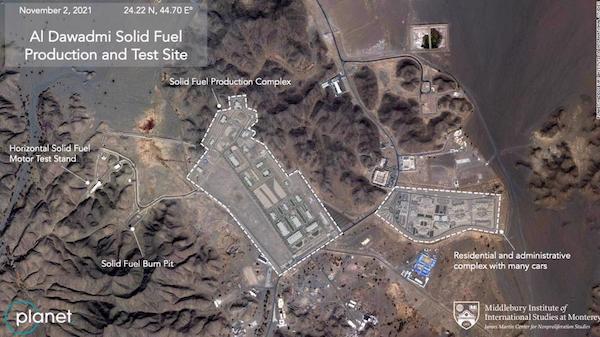
New US satellite images suggest Saudi Arabia is now producing ballistic missiles at the site. The key piece of evidence is that the facility is operating a "burn pit" to dispose of solid-propellant leftover from the production of ballistic missiles.
US satellite images show that Saudi Arabia is actively manufacturing its own ballistic missiles, according to an exclusive report published by the CNN website.
Satellite images acquired by the American broadcaster also suggest Saudi Arabia is currently manufacturing the weapons in at least one location.
Sources familiar with the latest US intelligence claimed in the report that China is helping the conservative kingdom in this regard.
Saudi Arabia has reportedly purchased ballistic missiles from China in the past but has now started producing its own, said the report.
In recent months, according to the report, US officials at several agencies, including the National Security Council at the White House, have been briefed on classified intelligence revealing a number of large-scale transfers of sensitive ballistic missile technology between China and Saudi Arabia.
The report observed that the administration of US President Joe Biden is concerned that Saudiís ballistic missile advancements could dramatically change regional power dynamics and complicate American attempts to put restraints on Iranís own missile technology.
The CNN report said Iran is unlikely to agree to roll back its ballistic missile program if Saudi Arabia has begun manufacturing its own ballistic missiles. Iran has said that its missile program is defensive and it will never accept restraints on it.
"While significant attention has been focused on Iranís large ballistic missile program, Saudi Arabiaís development and now production of ballistic missiles has not received the same level of scrutiny," Jeffrey Lewis, a weapons expert, and professor at the Middlebury Institute of International Studies, told CNN.
"The domestic production of ballistic missiles by Saudi Arabia suggests that any diplomatic effort to control missile proliferation would need to involve other regional actors, like Saudi Arabia and Israel, that produce their own ballistic missiles," Lewis added.
Despite decades of Washington-imposed sanctions, Iran has made great achievements in its ballistic missiles program.
A Pentagon study has hailed Iranís missiles program, saying its arsenal is larger than that of any other Middle Eastern countries.
"Iran has an extensive missile development program, and the size and sophistication of its missile force continues to grow despite decades of counter-proliferation efforts aimed at curbing its advancement," according to the Pentagon.
Iran has said its missile program is solely for defensive purposes and is not up for negotiations, and has rejected allegations by the previous US administration that the program violates Security Council Resolution 2231, which was adopted by the UN Security Council in July 2015 to endorse the Iran nuclear deal, officially called the Joint Comprehensive Plan of Action (JCPOA).
Then-US President Donald Trump unilaterally pulled out of the JCPOA in May 2018 and re-imposed the anti-Iran sanctions that the accord had lifted. He also placed additional sanctions on Iran under other pretexts not related to the nuclear case as part of his "maximum pressure" campaign.
The Biden administration had voiced a willingness to compensate for Trumpís mistake and rejoin the deal, but it has retained the sanctions as leverage.
Envoys from Iran and the P4+1 group of countries - Britain, France, Russia, and China plus Germany - began negotiations in the Austrian capital in April in a bid to resurrect the JCPOA.
The seventh round of the Vienna talks, the first under Iranian President Ebrahim Raeisiís administration, started on November 29 after a five-month pause.
LINK: https://www.ansarpress.com/english/25099
TAGS:






























 online news tv
online news tv




